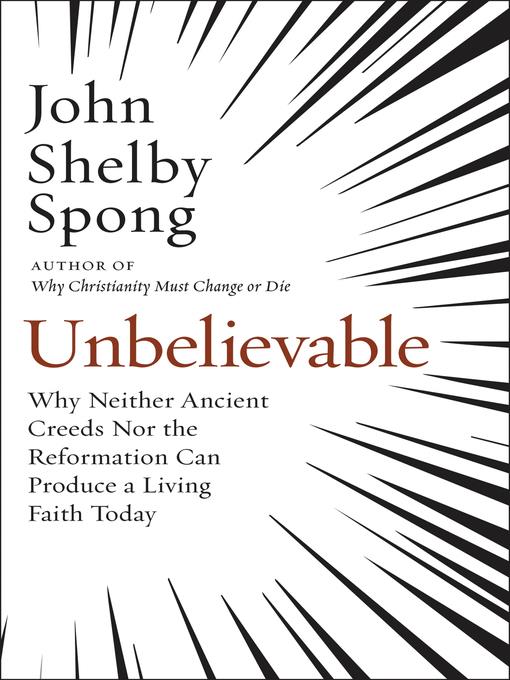
Unbelievable
Why Neither Ancient Creeds Nor the Reformation Can Produce a Living Faith Today
کتاب های مرتبط
- اطلاعات
- نقد و بررسی
- دیدگاه کاربران
نقد و بررسی

Starred review from December 11, 2017
Theologian Spong (Jesus for the Non-religious), the retired bishop of Newark, issues 12 theses for radically reforming Christianity in this provocative call for a modern Christian faith. Rejecting a traditional image of the supernatural and omnipotent God of theism, Spong declares that God is the name of the power and source of all life, and though God is ungraspable by human cognition, God’s force can be witnessed when living fully. Spong challenges the idea of original sin, claiming that Christians are not fallen creatures in need of salvation but are in fact evolving creatures always yearning for wholeness and seeking to be loved and empowered. This striving toward further evolution is the essence of grace, Spong argues, as it allows people to embrace all that we are capable of being. Resurrection, for Spong, is not some supernatural resuscitation of Jesus’s physical body, but God calling Christians forth into “our essential oneness, our universal consciousness, our interconnectedness.” Spong’s stimulating call for a newly revitalized Christianity will appeal to contemporary Christians who view traditional Christianity as dismayingly outmoded.

January 1, 2018
A call for a new reformation casting aside the beliefs of Christianity.Episcopalian bishop and prolific writer Spong (Biblical Literalism: A Gentile Heresy, 2016, etc.) has penned what he declares to be his final book, encapsulating a lifetime of thinking and teaching in order to call upon Christianity to undergo a transformation. Echoing Martin Luther, he offers 12 "theses" upon which to build his argument. Spong asserts that the entirety of traditional Christian theology has been debunked by science and reason, leaving the church intellectually bankrupt. The only answer is to turn toward a new understanding of God and of Jesus, salvation, and every other pillar of Christian thought and belief. The author sees God not as a being, but as "Being itself." Indeed, "God is not a noun we are compelled to define; God is a verb that we are invited to live." Similarly, Spong asserts that Jesus was not a supernatural being in any way but rather someone who demonstrated a new way of living and a higher plane of ethics. The author believes that the resurrection has been misinterpreted and that the New Testament authors did not expect their accounts to be taken literally. "Resurrection was...a moment of new revelation," writes Spong, "that occurred when survival-driven humanity could transcend that limit and give itself away in love to others, including even to those who wish and do us evil." Leaving the author's theology aside, his view toward modern Christianity is regrettably smug. Having made his home in the declining Episcopalian denomination, he seems to look at the "church" and see only his reflection: Western, highly-educated, and skeptical. Throughout his 12 theses, Spong speaks only for his own brand of waning Christianity, excluding even from consideration the tens of millions of Christians worldwide who may not share his views but indeed still believe in what he rejects.A Western elite's dream for a new Christianity.
COPYRIGHT(2018) Kirkus Reviews, ALL RIGHTS RESERVED.

January 1, 2018
Spong, the foremost popularizer of purging religious superstition and authoritarianism, here presents the 12 theses of the revivified, reformed Christianity he has long advocated. God is being, not a being. The Incarnation, original sin, virgin birth, atonement theology, the Resurrection and the Ascension of Jesus, unchanging ethical codes (e.g., the Ten Commandments), prayer, life after deathall must be jettisoned or reconceived. Capping those contentions is that Christianity must become genuinely universal; it must eradicate all invidious discrimination because of race, gender, and sexual orientation. Spong draws liberally on theologians and religious historians and his own pastoral and personal life to make his arguments in the manner of a cogent, smart preacher or lecturer speaking to all who want to keep Christianity while dispensing with miracles, dogma, and blind faith. This means that, if he is not a fine writer nor an entirely punctilious historian (a comma in a compound sentence can elide decades), he makes his thinking clear and accessible. Luther launched a reformation with 95 theses. Spong would launch another with 12.(Reprinted with permission of Booklist, copyright 2018, American Library Association.)

























دیدگاه کاربران